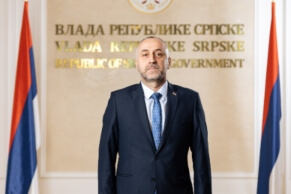BANJALUKA – “Nobody has ever been unlawfully appointed, nor will be appointed. An acting official who is appointed cannot be unlawfully appointed, which is why they are appointed as acting officials. If the acting official does not meet certain legally prescribed conditions, they could not have been appointed as a director but were appointed as an acting director.”

These are the words of the Prime Minister of Republika Srpska, Radovan Višković, from March of the previous year, and these words accurately depict the situation not only in public enterprises and institutions but also in public institutions in Republika Srpska. Interestingly, audits conducted by the Main Audit Office of the Public Sector of Republika Srpska show that the presence of acting officials in public institutions is directly correlated with the unlawful activities occurring in those institutions.
Ministry of Labor and Veterans’ Affairs of Republika Srpska
 In the report on the conducted financial audit of the Ministry of Labor and Veterans’ Affairs of Republika Srpska for the period from January 1 to December 31, 2022, it was found that the acting Secretary of the ministry was appointed for a period longer than 180 days, which is not in accordance with Article 42, paragraph (2) of the Law on Civil Servants. During the mentioned period, numerous irregularities were recorded within the ministry. Among other things, the audit revealed that in 2022, ten employees were engaged in the Ministry based on service contracts. Service contracts with eight employees were continuously concluded from the beginning of 2022 for tasks that represent the regular, core activities of the Ministry, which is not in accordance with Article 205 of the Labor Law.
In the report on the conducted financial audit of the Ministry of Labor and Veterans’ Affairs of Republika Srpska for the period from January 1 to December 31, 2022, it was found that the acting Secretary of the ministry was appointed for a period longer than 180 days, which is not in accordance with Article 42, paragraph (2) of the Law on Civil Servants. During the mentioned period, numerous irregularities were recorded within the ministry. Among other things, the audit revealed that in 2022, ten employees were engaged in the Ministry based on service contracts. Service contracts with eight employees were continuously concluded from the beginning of 2022 for tasks that represent the regular, core activities of the Ministry, which is not in accordance with Article 205 of the Labor Law.
In the examined public procurement procedures, it was determined that a contract was concluded with a supplier on April 28, 2022, for the procurement of services related to marking significant historical events (26 events). The contract was related to financing activities for the implementation of artistic and stage-technical services for the marking of significant historical events in 2022, in the amount of 60,000 KM without VAT. Two additional contracts were signed with the same supplier based on direct agreements for the same services, totalling 11,100 KM without VAT. This did not follow the appropriate procedure as prescribed by Article 6 of the Public Procurement Law. The total value of procurements carried out in 2022 with the mentioned supplier amounted to 219,796 KM including VAT, of which 136,609 KM were related to procurements where no public procurement procedures were conducted. Similarly, within the expenses for organizing receptions and events, other expenses for marking significant historical events were included, totaling 181,413 KM including VAT. These expenses for marking significant historical events, totaling 318,022 KM, were not subjected to public procurement procedures, which is not in accordance with Article 6 of the Public Procurement Law.
The procurement of fuel continued even after the contracted quantities were delivered under a previously concluded contract, without conducting new public procurement procedures, totaling 43,183 KM. This is not in accordance with Article 6 of the Public Procurement Law.
The report also found that the allocation of funds from the grant was carried out outside the scope of the Regulation on Criteria and Procedures for the Allocation of Grant Funds to Associations of Public Interest, Other Associations, and Foundations, as well as outside the scope of the Regulation on Special Criteria and Procedures for the Distribution of Funds from Games of Chance.
Ministry of Administration and Local Self-Government and Assistant Minister for the Administration Department
 In the report on the conducted financial audit of the Ministry of Administration and Local Self-Government of Republika Srpska for the period from January 1 to December 31, 2022, it is stated that the secretary of the ministry and the assistant minister for the administration department were not appointed, even though the Agency for Public Administration of Republika Srpska conducted and concluded a competitive procedure in 2022. The individuals appointed to these positions were assigned as acting officials during the year, and they already held appointment orders in the previous period, which is not in accordance with the Law on Civil Servants. According to the law, the appointment order for an acting official in the same position can be issued a maximum of two consecutive times for a period of up to 90 days without conducting a public competition procedure.
In the report on the conducted financial audit of the Ministry of Administration and Local Self-Government of Republika Srpska for the period from January 1 to December 31, 2022, it is stated that the secretary of the ministry and the assistant minister for the administration department were not appointed, even though the Agency for Public Administration of Republika Srpska conducted and concluded a competitive procedure in 2022. The individuals appointed to these positions were assigned as acting officials during the year, and they already held appointment orders in the previous period, which is not in accordance with the Law on Civil Servants. According to the law, the appointment order for an acting official in the same position can be issued a maximum of two consecutive times for a period of up to 90 days without conducting a public competition procedure.
During the audit period, it was found that the employment and filling of vacant positions were not carried out according to the personnel plan in accordance with Article 30 of the Law on Civil Servants, and the engagement of contracted employees was not done for tasks outside the ministry’s activities in accordance with the Labor Law.
Ministry of Finance of Republika Srpska – acting secretary and 4 assistants
 For the positions of assistant ministers in the departments of legal affairs, accounting and auditing, investment management, debt management, and for the secretary, acting officials have been appointed for a period of 90 days, exceeding the limit set by the Law on Civil Servants. The ministry has not complied with the aforementioned law for civil servants appointed by the Government of Republika Srpska, as it did not initiate the selection process at least 60 days before the expiration of the mandate of the person appointed to those positions. According to unofficial information obtained by Infoveza, the secretary of the ministry has been serving as an acting official for four years!
For the positions of assistant ministers in the departments of legal affairs, accounting and auditing, investment management, debt management, and for the secretary, acting officials have been appointed for a period of 90 days, exceeding the limit set by the Law on Civil Servants. The ministry has not complied with the aforementioned law for civil servants appointed by the Government of Republika Srpska, as it did not initiate the selection process at least 60 days before the expiration of the mandate of the person appointed to those positions. According to unofficial information obtained by Infoveza, the secretary of the ministry has been serving as an acting official for four years!
At the same time, the ministry has been hiring employees on a temporary basis contrary to the Law on Civil Servants, and according to the auditor’s report for 2021, the Law on Public Procurement has also not been followed. The same audit revealed that there are no criteria for granting funds in accordance with the Law on Budget Execution of Republika Srpska for the fiscal year and the Methodology for Grant Management for programs and projects funded or co-financed by budget funds.
It is interesting that a similar situation exists in other ministries, as we emphasized at the beginning, the poor practice of appointing acting officials in public enterprises and institutions has long been known.
Damjan Ožegović from Transparency International, speaking to our portal, explains that the status of managers in administrative bodies, public enterprises, and public institutions is regulated by different legal provisions. Since explicit procedures are not prescribed for the other two, this situation is often exploited for various political benefits.
“Primarily, these benefits relate to the ruling parties that appoint acting directors for a specific period in order to have easier control and influence over them and, consequently, dismiss them in case of disobedience. The compliant individuals in acting positions can remain in those positions for years, and many are rewarded with incompatible roles since the Commission for the Prevention of Conflict of Interest in the Authorities does not perceive acting officials as directors in their full capacity, even though they have all the rights and obligations of directors”, explains Ožegović.
Former member of the Management Board of BHRT and a doctor of political science, Ljubomir Zuber, says that the appointments of acting officials have become particularly common practice in the last decade, and this is not only characteristic of Republika Srpska but also of Bosnia and Herzegovina as a whole, as well as the surrounding countries.
“Every government inevitably loses authority over time, not only in the general public but also in its voter base (I’m referring to the real one, not the formal one), and then various ways of controlling personnel are found because there comes a point where ‘no one trusts anyone,’ regardless of whether they belong to the same party or so-called coalition partners. This is how you keep appointed personnel under control because it is easier to replace an acting official than an appointed individual. On the other hand, there are people who do not meet the legal requirements for appointment, so the ‘acting official’ is used as a ‘transitional solution’ that can last for years”, Zuber argues.
Zuber also shared an anecdote from the time when he himself worked as a journalist.
“Two decades ago, I was reporting from one of the sessions of the National Assembly of Republika Srpska when one of the newly appointed ministers said at a press conference that he was supposed to be the Minister of Defense, but he didn’t even know how he ended up with the ministry he got”, Zuber recounted. He concluded that it is highly controversial to insist on party loyalty as the key argument for holding a position where candidates are expected to “not think for themselves.”
Although ministries, based on our previous experience, comply with the Law on Freedom of Access to Information and almost always respond to our inquiries, that was not the case this time, and we were denied their response.

Written by: Stefan Blagić

